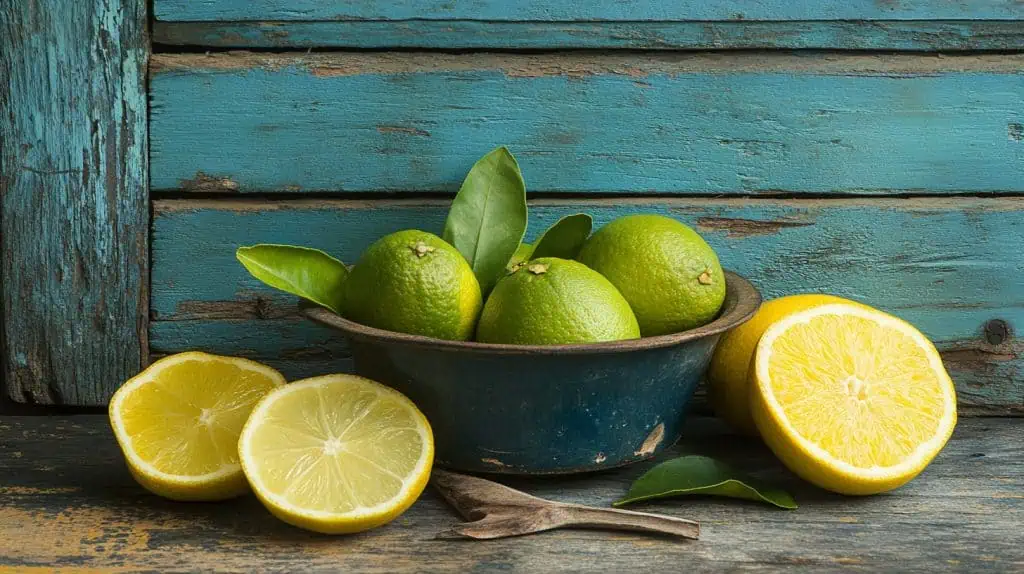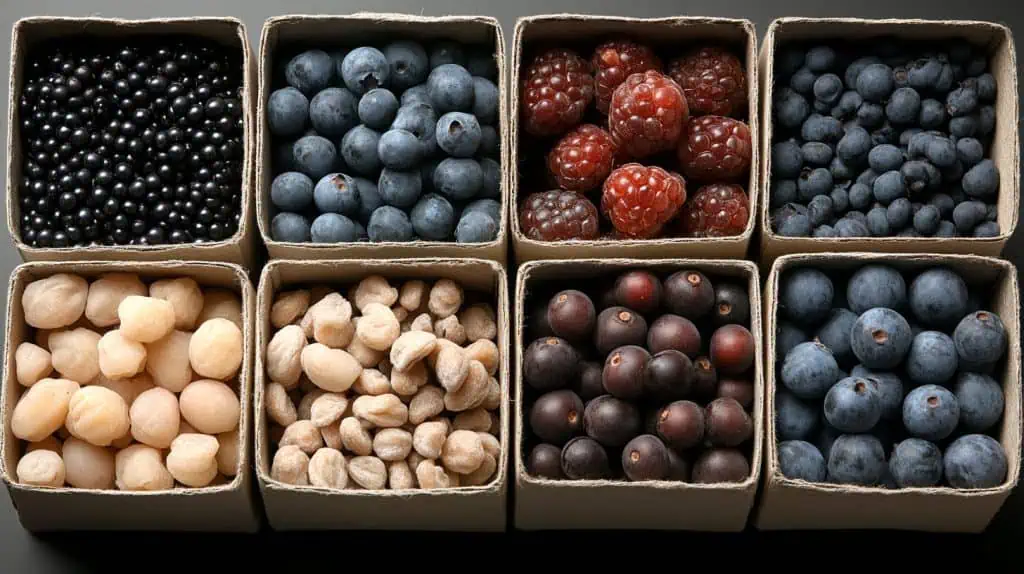As the years have rolled on, I’ve noticed a few changes in my 50s: my energy levels have dipped a little, my skin seems to be spilling secrets about my age… the usual signs of aging.
Until I hit the big 5-0, I had never taken supplements in my life. I prefer to do things the natural way, and anyway, I didn’t think I needed them. Everything changed when I paid for a health check, including a full blood screening.
Well, was I surprised? I’m a pretty healthy guy – or so I thought. Results showed low vitamin D, low vitamin C, low this, low that.
So, I decided to read everything I could about antioxidant supplements to truly understand what’s going on in our bodies and what we need as we age.
See which other nutrients could help you live longer from our full list of anti-aging supplements.

Understanding Antioxidants
The first thing to say is that there is so much misleading and contradictory information out there. So, I have talked to experts and read everything I can to work out a plan for what I should be doing as I age. I hope it helps.
Role of Antioxidants in Aging
Turns out antioxidants are a pretty big deal when it comes to keeping these changes in check. They’re like little warriors in your body, fighting off free radicals. Those are the bullies of the cell playground, which can lead to issues like diabetes, heart trouble, and even cancer.
Antioxidants, such as selenium, vitamin E, and vitamin C, are the nachos to your guacamole when it comes to dealing with skin – from shielding it from the sun to smoothing out the wrinkles and worry lines (source).
Getting these guys into your snacks and skincare acts like a wellness insurance policy against the wear and tear of time and helps dodge those nagging illnesses.
If you want a deeper dive, read my articles on vitamin C anti-aging benefits and selenium anti-aging benefits.
Common Antioxidants and Sources
Stumbling onto natural antioxidant hotspots is like finding secret treasure maps for wellness. Fruits, veggies, and other leafy wonders are jam-packed with these goodies. Here’s a cheat sheet of some big players and where to score them:
| Antioxidant | Sources | Benefits |
|---|---|---|
| Vitamin C | Citrus fruits, strawberries, bell peppers | Pumps up the immune system, does wonders for skin |
| Vitamin E | Nuts, seeds, spinach | Armor for the skin, backs up immune defenses |
| Selenium | Brazil nuts, sunflower seeds, seafood | Keeps skin young, looks after thyroid |
| Polyphenols | Dark chocolate, berries, green tea | Shields against illness and inflammation |
| Phytosterols | Legumes, nuts, whole grains | Heart health, kicks cholesterol to the curb |
Nibbling your way through these antioxidant-rich goodies takes some work to crowbar them into your diet. So, I also add supplements to cover my bases.
Ok, so you’re not suddenly going to turn into Benjamin Button. But, for people hitting their fabulous 50s and beyond, anti-aging supplements can really help flip the script against the test of time. (Don’t forget, you’re playing the long game.)
There are a ton of kitchen hacks to boost those antioxidants in your meals. Steaming veggies is much healthier compared to boiling, and a squeeze of lemon juice on salads gives those nutrients a lift!
Whether it’s chowing down on antioxidant-packed meals or adding supplements, it will make a serious difference to your overall health. Things like CoQ10, resveratrol, and glutathione can do a great job of spicing up your daily intake, giving you that extra oomph.
You don’t have to suddenly become a vegetarian. Just understanding and then sprinkling in antioxidants will put you on a much healthier track. Focus on tasty, healthy foods and then top up with supplements.
If you want to dive deeper into choosing top-notch antioxidants, have a look at the anti-aging supplements guide. And if your skin’s been acting up, see how specific antioxidants for skin health can lend a hand.
Impact of Free Radicals
Harmful Effects of Free Radicals
Antioxidants are like tiny superheroes protecting your cells from these free radicals… which are basically unstable hooligans born from things like pollution, sunburn, or just not moving enough.
An active, healthy body is much better at crushing these potential killers. And as we get older, our bodies slow down and become less able to overcome them.
If these free radicals go unchecked, they start destroying cells, messing with DNA, and speeding up the aging process while also playing a supporting role in various diseases.
Too many of these rebel molecules can lead to heart disease, liver disease, and various cancers (like oral, esophageal, stomach, and bowel types).
The body’s defense is like a bouncer at a club – it can handle a few troublemakers, but a continuous influx can overwhelm the system.
Importance of Neutralizing Free Radicals
It’s a big deal because cutting down on the cellular chaos can help dodge chronic diseases like Alzheimer’s. Oxidative stress (an imbalance of free radicals and antioxidants) is a major player in brain aging and decay.
Munching on the right stuff can keep these processes in check. So, what are we talking about?

Flavonoids
Flavonoids are found in lots of plant-based foods and drinks. They fight toxins and have anti-inflammatory properties. A recent study suggests that flavonoids may also reduce blood pressure (American Heart Association).
Here are some flavonoid-rich foods:
- Apples
- Berries
- Plums
- Cherries
- Citrus fruits
- Onions
- Legumes
- Tea
- Cocoa
- Olive oil
- Red wine
Once again, I use antioxidant supplements to cover the bases. However, you don’t want to consume more than the daily recommended amount. So, seeking advice from a health professional is always recommended.
would be a smart move. For more deets on supplements tackling everything from brain fortification to skin glow-ups, checking out some targeted solutions might be worth a peek.
Antioxidant-Rich Foods
Hitting 50 totally changed my diet. I realized I was overweight, not sleeping enough, and eating badly. But the good thing about a healthy diet is that you don’t have to eat less – just eat better!
That means eating more foods loaded with antioxidants to tackle those free radicals and help protect your body. You’re giving it extra power to fight.
Vitamins A, C, and E, as well as minerals like copper, zinc, and selenium, play the hero by gobbling up free radicals and dodging the chaos that oxidation can cause (Better Health Victoria).
Best Food Sources of Antioxidants
Losing the processed food is the big one. And then adding foods with antioxidants into my meals really turned things around for me. Here are some actually tasty options that do wonders for the body:
|
Food |
Key Antioxidants |
|---|---|
|
Blueberries |
Vitamin C, Vitamin K |
|
Dark Chocolate |
Flavonoids |
|
Kale |
Vitamin A, Vitamin C |
|
Spinach |
Vitamin E, Beta-Carotene |
|
Nuts (Almonds) |
Vitamin E |
|
Green Tea |
Catechins |
|
Red Bell Peppers |
Vitamin C, Beta-Carotene |
|
Strawberries |
Vitamin C, Manganese |
Eating a colorful mix of these goodies isn’t just good for variety – it’s a feast of antioxidants, as described by WebMD. They say a rainbow diet of fruits, greens, and grains is the way to go. Eat as many different colors as you can every day.
Cooking Tips to Enhance Antioxidant Absorption
I’ve also picked up a few kitchen hacks to squeeze more antioxidants from my food. Here are some easy tips:
- Steaming Veggies: Keeps those precious water-soluble vitamins (like Vitamin C) intact in vegetables like kale and spinach. Much better than boiling.
- Healthy Fats to the Rescue: Cooking up antioxidant-packed foods with a dab of olive oil helps soak up fat-soluble vitamins, namely A and E.
- Food Matchmaking: Combining foods can lead to higher antioxidant intake. Ever pair tomatoes with olive oil? It amps up lycopene absorption.
- Gentle Cooking: Broccoli, cooked until tender but not mushy, retains more antioxidants than the waterlogged versions from long boiling.
These tricks help us tap into the full potential of antioxidant-rich foods, adding a shield against aging and various diseases. Just tweaking the way I cook has stopped me from wasting lots of nutrients that were always there.
Take a look at our article on vitamins for aging health for more golden nuggets (sorry – not helping!) on keeping healthy as the years roll by.
Supplements for Anti-Aging
In the past, this has been the point at which I got bored and overwhelmed by all the choices available. There are a ton of options, and I didn’t have the time to research 100 different things.
But now I do… So I’ve done it for you!
Effective Antioxidant Supplements
It’s true, there’s no magic pill, but some supplements really are good at fighting aging. Let’s look at the ones that pack a punch:
|
Supplement |
What It Does for You |
|---|---|
|
Vitamin C |
Helps your skin look great by boosting collagen, plus it’s great at playing defense against oxidative stress. |
|
Vitamin E |
Supports your cell troops for energy and keeps your noggin sharp. |
|
Coenzyme Q10 |
Supports your cells for energy and keeps your brain sharp. |
|
Resveratrol |
Linked to the “French paradox*” it’s got your heart’s back. |
|
Glutathione |
Dubbed the “master antioxidant,” it’s like the cleanup crew for your body. |
|
Green Tea Extract |
This stuff is full of catechins like EGCG, boosting brain health and even more efficient than Vitamins C and E. |
|
Collagen |
Keeps your skin bouncy and your joints freely moving. |
* “French paradox” refers to improved cardiovascular outcomes despite a high-fat diet in French people.
For more info about maintaining your skin, you might want to read my article on the benefits of collagen supplements.
Potential Risks of High-Dose Antioxidant Supplements
While it’s tempting to load up on antioxidants, going overboard can have the reverse effect, and actually be harmful.
- Too Much: Overloading can backfire, leading to the “antioxidant paradox,” where instead of being the hero, it might actually be toxic (Healthline).
- Cancer Warning: A few studies hint that taking mega doses could turn up the dial on cancer risk (Better Health Victoria).
|
Risk |
What Could Happen |
|---|---|
|
Too Much |
Being harmful instead of a protector if you overdo it. |
|
Cancer Warning |
Some supplements might up your cancer risk. |
|
Real Food Beats Pills |
Eating real food is always the better option with greater benefits. |
I always advise talking to your health expert or dietitian to find out how to use antioxidant supplements safely for your unique body.
And for more details on safe supplement combos, see my article on supplement interactions.

Targeted Antioxidant Benefits
Antioxidants for Skin Health
So, if you want to fend off some of those wrinkles and keep your skin glowing for longer, antioxidants are your best pals. Selenium, vitamin E, and vitamin C help your skin fight back against the sun and slow down aging (WebMD).
- Selenium: Acts as your skin’s personal bodyguard against cancer and keeps it nice and stretchy.
- Vitamin C: The builder that fixes up rogue radicals before they start working on your face.
- Vitamin E: The ultimate hydrator that helps iron out those tell-tale lines.
| Antioxidant | What It Does for Skin | Where You Find It |
|---|---|---|
| Selenium | Fights off skin cancer | Brazil nuts, fish, eggs |
| Vitamin C | Radical repair enthusiast | Citrus fruits, bell peppers, strawberries |
| Vitamin E | Smooths out wrinkles | Almonds, sunflower seeds, spinach |
Antioxidants for Neuroprotection
Now, onto brainier pursuits. Antioxidants don’t just keep our skin in check – they also battle stress and flame-ups, keeping your noodle in tip-top shape, too.
- Pistacia lentiscus L. seed oil (PLSO): Also known as Lentisk oil or Schinos oil, it helps your brain stay zen with its anti-stress defense and keeps cells ticking over. (NCBI).
- Nicotinamide (Vitamin B3): Gives your brain’s powerhouse a little boost, helps keep stress in the cellar, and your thinking sharp (NCBI).
And here’s where to find them:
| Antioxidant | Brain Benefits | Where It Hides |
|---|---|---|
| PLSO | Chillaxing stress buster | Pistacia lentiscus L. seed oil. Use it on salads from the bottle |
| Nicotinamide | Enlivens brain batteries | Fish, poultry, nuts, legumes, eggs, cereal grains |
If you’re contemplating these supplements to energize your brain, you might be interested in my article on supplement dosage.
Emerging Antioxidant Insights
As I searched for the best anti-aging supplements, it’s been really interesting to find out the latest scoop in antioxidant research along the way.
So, in this part, I’m going to talk about the new finds and where things are headed with antioxidants, and how they play in the anti-aging game.
Advances in Anti-Aging Antioxidants
Recent studies have shown off a bunch of flashy antioxidant compounds with serious potential to give aging a run for its money. I just mentioned Pistacia lentiscus L. seed oil (PLSO), for example.
There’s some pretty convincing research about how the molecules in PLSO can calm down oxidative stress and inflammation. It even seems to stop cells from dying and switch on some impressive protective perks (NCBI).
This oil might just help you dodge some of the aging blues like sarcopenia (age-related progressive loss of muscle mass and strength), which have previously seemed inevitable.
Then we’ve got SkQ1, a mitochondria-focused antioxidant. The buzz is that SkQ1 can ease Alzheimer’s symptoms in animals. By blocking those tau proteins in the brain from going off the rails, SkQ1 might just help tackle human Alzheimer’s, too (NCBI).
Resveratrol (RSV) is still hogging the spotlight in antioxidant circles. You find this one in red wine, and it’s been suggested it might explain why people in France, who love their red wine, seem to have fewer heart issues.
Nobody is 100% sure which part of the Mediterranean diet is responsible. But RSV can boost cell health and may just keep you living longer (PMC).
Future Directions in Antioxidant Research
The future? It’s looking good for antioxidant research. Curious minds are digging deep into how they work and what they bring to the table. One path worth a peek is looking at exercise’s effect on fighting oxidative damage.
Experiments using both animals and humans suggest working out boosts the body’s fight against this damage. Those golden-agers who go hard on endurance training seem to have more active antioxidant enzymes, even in muscles that should be slowing down (PubMed Central).
There’s also a boom in interest around new antioxidant goodies straight from Mother Nature. Studies on things like SkQ1 and PLSO are showing the promise of zeroing in on mitochondria and using plant-based antioxidants to beat aging’s effects.
Researchers are zeroing in on the genetic side of oxidative stress too. The thought is that by finding out more about the genetic differences in handling oxidative stress, we could create more personal and targeted antioxidant treatments.
And finally, you can read about how NMN supplements could lead the way in fighting aging-related disorders, like oxidative stress and neurodegeneration, here.
The Bottom Line
Looking down the road, I suspect there’ll be even more revelations about antioxidants. There’s a lot of ongoing research and a lot that we still don’t know.
By upping your levels of antioxidants, you can take charge of a healthier, more energetic you. From vitamins to minerals and everything in between, the world of antioxidants is bringing new hope and a shot at a healthier, longer life.
Editorial Process
We believe in writing honest and unbiased reviews based on real-world experience. For more details, read our editorial process.
Some of the links in this article may be affiliate links, which can compensate us at no cost to you if you make a purchase. These are products we’ve personally used and tested. This site is not intended to provide financial or health advice. You can read our affiliate disclosure in our privacy policy.
Richard Riviere is a former 9-5er who was fat, frazzled, and fifty.
“There has to be more to life than this”, he decided. So, quit his 30-year career to research how to become healthier and wealthier after 50.
He now teaches other midlifers how to start living life on their own terms again.
